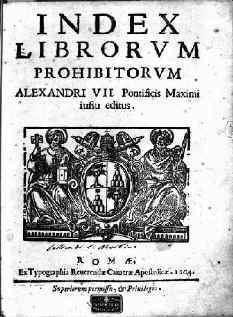
 The Angelica Library, in Rome, is a public library located next to the church of Sant’Agostino. Among its numerous shelves of original and fragile manuscripts dating back centuries exists a very important collection that the Catholic Church hid from public view since 1559- the Index Librorum Prohibitorum, or List of Prohibited Books.
The Angelica Library, in Rome, is a public library located next to the church of Sant’Agostino. Among its numerous shelves of original and fragile manuscripts dating back centuries exists a very important collection that the Catholic Church hid from public view since 1559- the Index Librorum Prohibitorum, or List of Prohibited Books.
The first version, known as the Pauline Index, was spread by Pope Paul IV, and which Paul F. Grendler believed marked “the turning-point for the freedom of enquiry in the Catholic world”, before being replaced by a more thoughtful version less than a year later.
In an attempt to “protect the faith and morals of the faithful,” the purpose of the Index was to collect publications deemed heretical, anti-clerical, or lascivious in preparation for their censorship by the Church. The 20th– and final- edition was compiled in 1948, and the Index was officially ended by Pope Paul VI on June 14, 1966, siting a “loss of relevance of the Index in the 21st century.”
Various editions of the Index codified rules of the Church relating to the reading, selling, and proactive censorship of books, such as editions and translations of the Bible that had not been approved by the Church.
Among the works assembled included works by astronomers, such as Johannes Kepler’s Epitome astronomiae Copernicanae, which was on the Index from 1621 to 1835, and philosophers like Immanuel Kant, whose Critique of Pure Reason ruffled a few flabellas.
Other famous works by Machiavelli, Copernicus, and Erasmus, as well as Voltaire’s Candide and Jonathan Swift’s A Tale of a Tub have all shared time on the list.
Some of the scientific theories on the Index have been routinely taught at Catholic universities worldwide throughout the years; for example, the books advocating heliocentrism from the Index were finally allowed in 1758.
The burning at the stake of Giordano Bruno, whose entire written works were placed on the Index in 1603, came after charges of teaching the heresy of pantheism; and a paper by Antonio Rosmini-Serbati was on the Index until being beatified in 2007.
Times certainly have changed and the Index has inspired Romanian artist Ileana Florescu’s new show, “Libri Prohibiti,” which opened at Angelica Library earlier this month.
She selected 21 of the banned texts- most of them modern editions, some from antique markets- and dipped them in the waters off of Maine and Sardinia, and photographed their disintegration. “The sea is a destructive force, but also one that restores lost treasures,” she explained. “I realized this as I observed its effect on the books. The structure dissolved and the colors blurred together as if they were ablaze, which brought to mind the fires of censorship.”
To a bibliophile like me, the thought of purposefully dunking the delicate and precious pages of a book in water may seem like one of the most heretical and sacrilegious acts a person can perform, but there, amid the emotions and physicality lies the beauty of the act. As the water washes over and distorts the pages of history the names and heart-poured words from the past appear more clearly, even though they are distorted. It is at that moment between creation and destruction that the lesson of tomorrow is learned- that the printed word may be finite and tangible; but ideas, thoughts, and dreams- no matter the form of their oppression- can never truly be destroyed. They spread, like the ripples caused by the book in the water, to merge with other ripples forming a tidal wave that washes over the consciousness of the world.
For more information on the Banned Books Awareness and Reading for Knowledge project and the complete list of titles covered, please visit the official website at http://bbark.deepforestproductions.com/
Sources: Wikipedia, NY Times
© 2015 R. Wolf Baldassarro/Deep Forest Productions


Leave a Reply